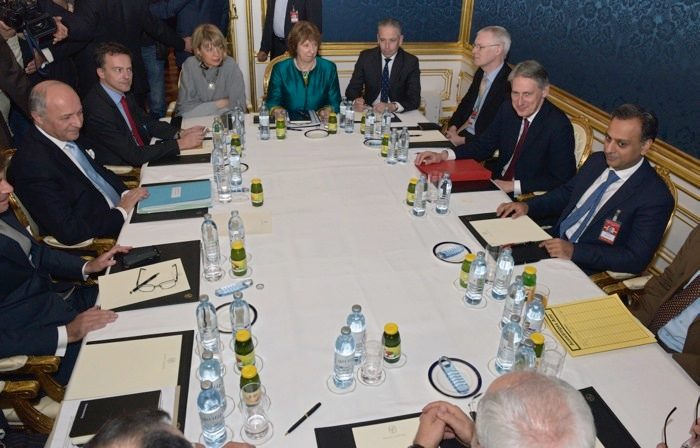SUMMARY
This is AI generated summarization, which may have errors. For context, always refer to the full article.

VIENNA, Austria – Iran and world powers engaged Sunday, November 23, in a diplomatic blitz less than 36 hours before a deadline for a nuclear deal, with Tehran signalling openness to extending talks by up to a year.
Officials on both sides insisted however that for the rest of Sunday at least, they were still pulling out all the stops to nail down in Vienna what would be a mammoth agreement by midnight Monday.
However, large gaps appeared to remain in crucial areas of the negotiations involving uranium enrichment and sanctions relief.
The five permanent members of the UN Security Council (the P5+1) have been locked in talks with Iran for months to turn an interim deal struck in Geneva that expires on Monday into a lasting accord.
Such a deal is aimed at easing fears that Tehran will develop nuclear weapons under the guise of its civilian activities, an ambition the Islamic republic hotly denies.
It could end a 12-year standoff that has hobbled the Iranian economy and prevented a normalisation of Tehran’s ties to the West after 35 years in the deep freeze.
Moment of truth
US Secretary of State John Kerry, in Vienna since Thursday, was set to hold the latest in a series of meetings later Sunday with Iranian Foreign Minister Mohammad Javad Zarif.
German Foreign Minister Frank-Walter Steinmeier arrived on Saturday, calling the talks a “moment of truth”, while his counterparts from Russia, China, Britain and France were also expected by Monday at the latest.
Saudi Foreign Minister Prince Saud al-Faisal also jetted into the Austrian capital, with Kerry updating the prince on his plane at Vienna airport about the talks, diplomats said.
Sunni Gulf monarchies are wary of any US rapprochement with Shiite Iran. Better ties with Tehran could however lead to cooperation with the US in other areas, not least tackling Islamic State militants in Syria and Iraq.
Kerry on Saturday spoke to Israel’s Prime Minister Benjamin Netanyahu by phone. The Jewish state, widely thought to have nuclear weapons itself, has not ruled out bombing Iran’s nuclear facilities.
“We’re working hard,” Kerry said Saturday in Vienna. “And we hope we’re making careful progress, but we have big gaps, we still have some serious gaps, which we’re working to close.”
Gaps
Diplomats on both sides say that the two sides remain far apart on the two crucial points of contention: uranium enrichment and sanctions relief.
Enriching uranium renders it suitable for peaceful purposes like nuclear power but also at high purities for the fissile core of a nuclear weapon.
Tehran wants to massively ramp up the number of enrichment centrifuges — in order, it says, to make fuel for future reactors – while the West wants them dramatically reduced.
Iran wants painful UN and Western sanctions that have strangled its vital oil exports lifted, but the powers want to stagger any relief over a long period of time to ensure Iranian compliance with any deal.
Extension
In view of the difficulties – and of the dangers posed by a complete collapse – many experts believe that the negotiators may give themselves more time.
Diplomats admit this is a possibility but stress that they remain focused on getting a deal in time and that an extension is not on the table – yet.
“There’s no talking going on about extending talks on Iran…even in internal consultation,” news agency RIA Novosti quoted a source in the Russian delegation as saying.
But an Iranian source – echoing comments by a European diplomat – said that “if between now and this afternoon or this evening we don’t get there, the solution is we consider an extension.”
“That could be for a period of six months or a year,” the source said.
Such an extension would be under the terms of an interim accord reached in Geneva a year ago trading a temporary freeze on some aspects of Iran’s nuclear activities for limited sanctions relief.
A senior US official said late Saturday that the aim was still to reach a deal in time “but we are discussing both internally and with our partners a range of options”.
Another extension – as happened with an earlier deadline of July 20 – carries risks of its own, however, not least possible fresh US sanctions, leading Iran to walk away. – Rappler.com
Add a comment
How does this make you feel?
There are no comments yet. Add your comment to start the conversation.